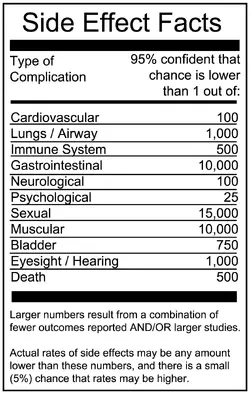Now you are just being silly. Doctors have more education and experience to base their decisions on than you do with some stats. It's not just a numbers game, its a big picture thing.
1)
What exactly do you think doctors learn in medical school that makes them better able to decide from the same set of numbers which choice better fits my personal opinions on life outcomes?
Seriously, what part of the curriculum? My brother is a medical doctor and I'm pretty familiar with the different phases of his education, and I'm not aware of any part of medical school or residency that would make him more qualified than me on a decision like this.
In fact, my own psychology and philosophy degrees and subsequent years earning a living doing research have given me
MUCH MORE statistics training and real world application of statistics and scientific analysis and interpretation of published studies than he got in school or in his career.
2)
Even if I wasn't a professional researcher, I would still be perfectly capable of interpreting numbers collected and presented to me in a clear way. Once it's been collected from studies and put in a tabular format, you only would need a
high school education, if that, to make an informed decision from it. If you still trust doctors more and want doctors to offer their own opinion ON TOP OF giving us the raw numbers, then fine, that's okay. But I don't see any argument here for keeping the data from us. Give
both.
Policies that just assume every lay person is an ignorant slob who must be shielded from any critical thinking of their own decisions are inappropriate and dangerous.
3)
You're right it's not "just a numbers game." There are a bunch of non-numbers factors involved, almost all of which I know better than my doctor on.
Because there is no "best medical decision" in almost any case in any objective sense. There are always tradeoffs in intangibles. For example, chemo buying you a few extra years, but you're going to be super sick during them, is it worth it or not? There's no objective answer to that. It depends on the patient's current amount of unfinished business in life, their philosophy, how much they care about quality vs. quantity. There's NO way for the doctor to know any of those things, which constitute the majority of the decision to be made. I know myself and my preferences infinitely better.
This is equally true of vaccines and any other procedure too. In fact, it's even MORE true of something like vaccines, because death and complications are so much less likely than with chemotherapy, that we have much less data on the complications. So it's an even greater %age of gut instinct and philosophy and subjective junk. But for some reason they just aren't treated the same way. That's what is bothering me.
I should have been more specific. Clinical studies for OTC products is what I was referring to. Clinical trials for actual prescription drugs ad treatments are a different kettle of fish.
This is an interesting distinction which is also troubling.
How do you know whether to run something as an OTC trial versus a prescription trial, if you haven't run the trial yet, and have no idea how dangerous it might be? There is yet another layer of guesswork going on at this decision point.
It's up to the scientists to decide whether that difference is clinically significant or not.
Yes, but they don't have the training to do so. I know they don't, because nobody does, because it's mathematically / clinically / logically / in every other way
impossible to extrapolate from data on 500 participants to make decisions about events which might be critically important even at rarities as low as 1/1,000 or 1/10,000. It simply can't be done. You need vastly more raw data.
It's exactly like saying "Hm, I wonder how often this die will land on a 6? Let's roll it 3 times, tabulate the results, and then make a conclusion."

![[No title]](/data/xfmg/thumbnail/36/36299-468f060314a0ac2bf5e37da1c33149d2.jpg?1734168618)
![[No title]](/data/xfmg/thumbnail/41/41926-7b67b67ec3a4ea78149adc9ca76efe76.jpg?1734176285)








![[No title]](/data/xfmg/thumbnail/36/36301-27972c0474532c2ef657014362950733.jpg?1734168626)
